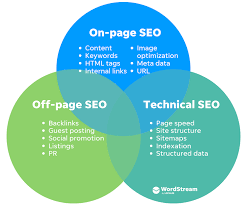
Search Engine Optimization (SEO) is a crucial aspect of any digital marketing strategy. It helps websites rank higher in search engine results pages, driving organic traffic and increasing visibility. One key component of SEO is page analysis, which involves assessing individual web pages to improve their performance and relevance to search engines.
SEO page analysis is the process of evaluating various elements of a web page to determine how well it is optimized for search engines. This includes examining factors such as keyword usage, meta tags, content quality, internal and external links, site speed, mobile-friendliness, and more. By conducting a thorough analysis, website owners can identify areas for improvement and implement strategies to enhance their search engine rankings.
By regularly performing SEO page analysis, website owners can:
To conduct effective SEO page analysis, consider the following steps:
In conclusion, SEO page analysis is a vital process for enhancing website visibility and attracting organic traffic. By understanding the key components of effective page analysis and implementing best practices, website owners can improve their search engine rankings and drive sustainable growth online.
To enhance the effectiveness of your SEO page analysis, it is essential to begin by conducting thorough keyword research to pinpoint relevant keywords for your webpage. By identifying and incorporating these targeted keywords strategically within your content, meta tags, and headings, you can significantly improve the page’s visibility and relevance to search engines. Understanding the search terms that your target audience uses allows you to optimise your content accordingly, increasing the likelihood of attracting organic traffic and boosting your website’s overall performance in search engine results pages.
To enhance your SEO performance, it is essential to analyse your competitors’ pages and gain insights into their SEO strategies. By studying their keyword usage, content quality, meta tags, and backlink profiles, you can identify areas where they excel and uncover opportunities for improvement in your own SEO efforts. Understanding the tactics that are working well for your competitors can help you refine your own strategies and stay ahead in the competitive digital landscape.
To enhance the effectiveness of SEO page analysis, it is crucial to optimise meta tags, such as the title tag and meta description, by incorporating targeted keywords. These meta tags play a significant role in informing search engines about the content and relevance of a web page. By strategically including relevant keywords in the title tag and meta description, website owners can improve their chances of ranking higher in search engine results pages for specific search queries. This practice not only enhances visibility but also increases the likelihood of attracting organic traffic from users actively seeking information related to those keywords.
To enhance the effectiveness of SEO page analysis, it is essential to ensure that your content is of high quality, engaging, and relevant to your target audience. Quality content not only attracts and retains visitors but also signals to search engines that your website provides valuable information. By creating engaging and relevant content tailored to the needs and interests of your audience, you can improve user experience, increase dwell time on your site, and ultimately boost your search engine rankings. Remember, content is king in the digital realm, so investing time and effort in crafting compelling material can significantly impact the success of your SEO strategy.
Improving page loading speed is a critical aspect of SEO page analysis. A faster loading website not only enhances user experience by reducing waiting times but also plays a significant role in boosting search engine rankings. Search engines like Google prioritize websites that load quickly as they provide a better user experience. By optimising page loading speed, website owners can not only retain visitors but also attract more organic traffic and improve their overall online visibility.
Utilising internal linking is a valuable strategy in SEO page analysis to enhance site structure and assist search engines in navigating through your content effectively. By strategically linking relevant pages within your website, you can establish a logical hierarchy, improve user experience, and distribute link equity across your site. This practice not only helps search engines discover and index your pages more efficiently but also enhances the overall coherence and authority of your website, ultimately contributing to improved search engine rankings and organic traffic growth.
Regularly monitoring and analysing your page performance using tools such as Google Analytics and Search Console is essential for maintaining a strong SEO strategy. These tools provide valuable insights into how your website is performing, including metrics on traffic, user behaviour, keyword rankings, and more. By consistently tracking and analysing this data, you can identify areas for improvement, track the effectiveness of your SEO efforts, and make informed decisions to enhance your website’s visibility and performance in search engine results pages.
4 thoughts on “Unlocking Success: Mastering SEO Page Analysis for Optimal Website Performance”
These are really enormous ideas in regarding blogging. You have touched some pleasant
things here. Any way keep up wrinting.
Thank you for your positive feedback! We’re glad you found the information on SEO page analysis enjoyable. We will continue to provide valuable insights and tips on optimizing web pages for search engines. Keep checking back for more helpful content!
Keep this going please, great job!
Thank you for your positive feedback! We’re glad you’re finding the information helpful. If you have any questions or need further assistance regarding SEO page analysis, feel free to ask.